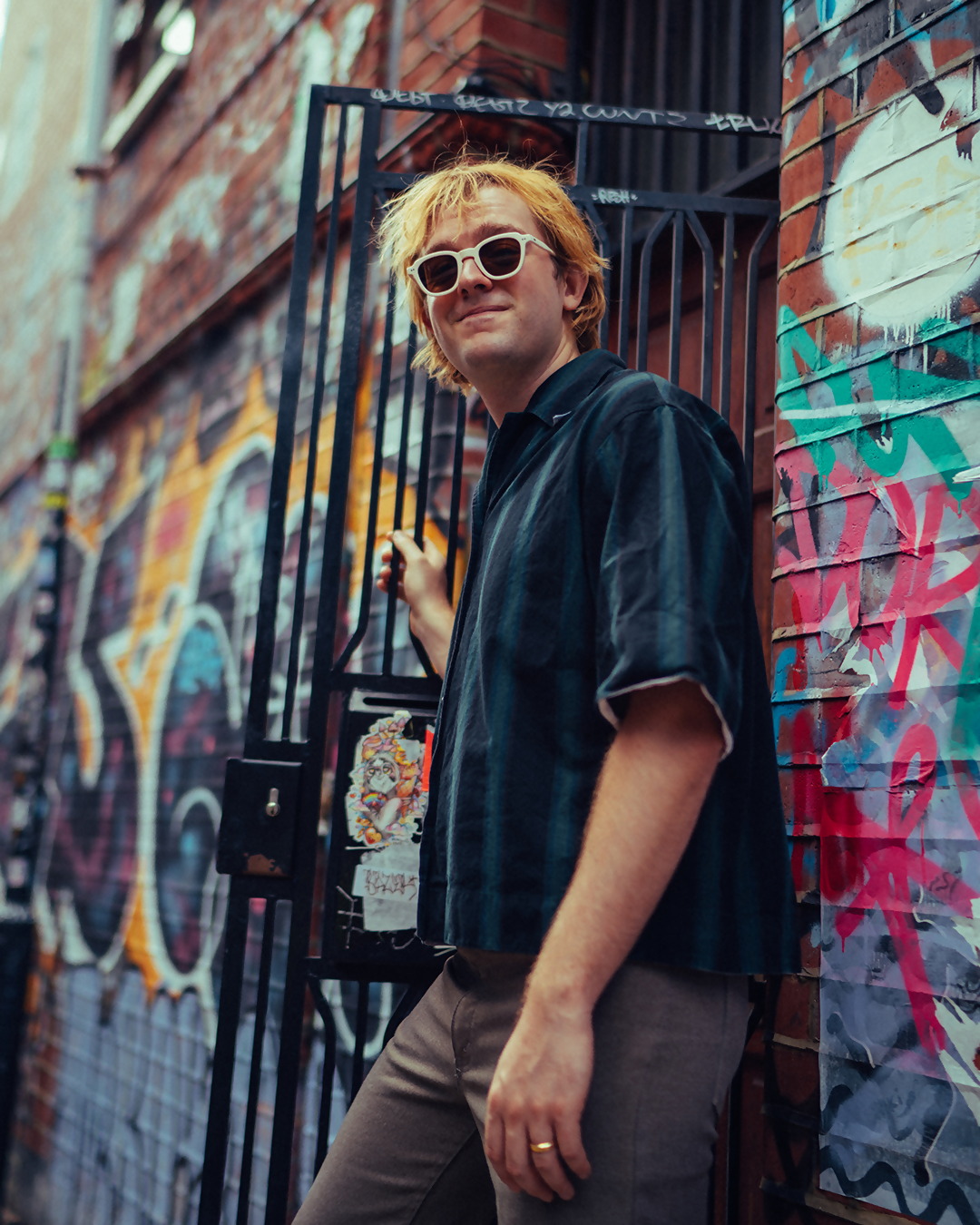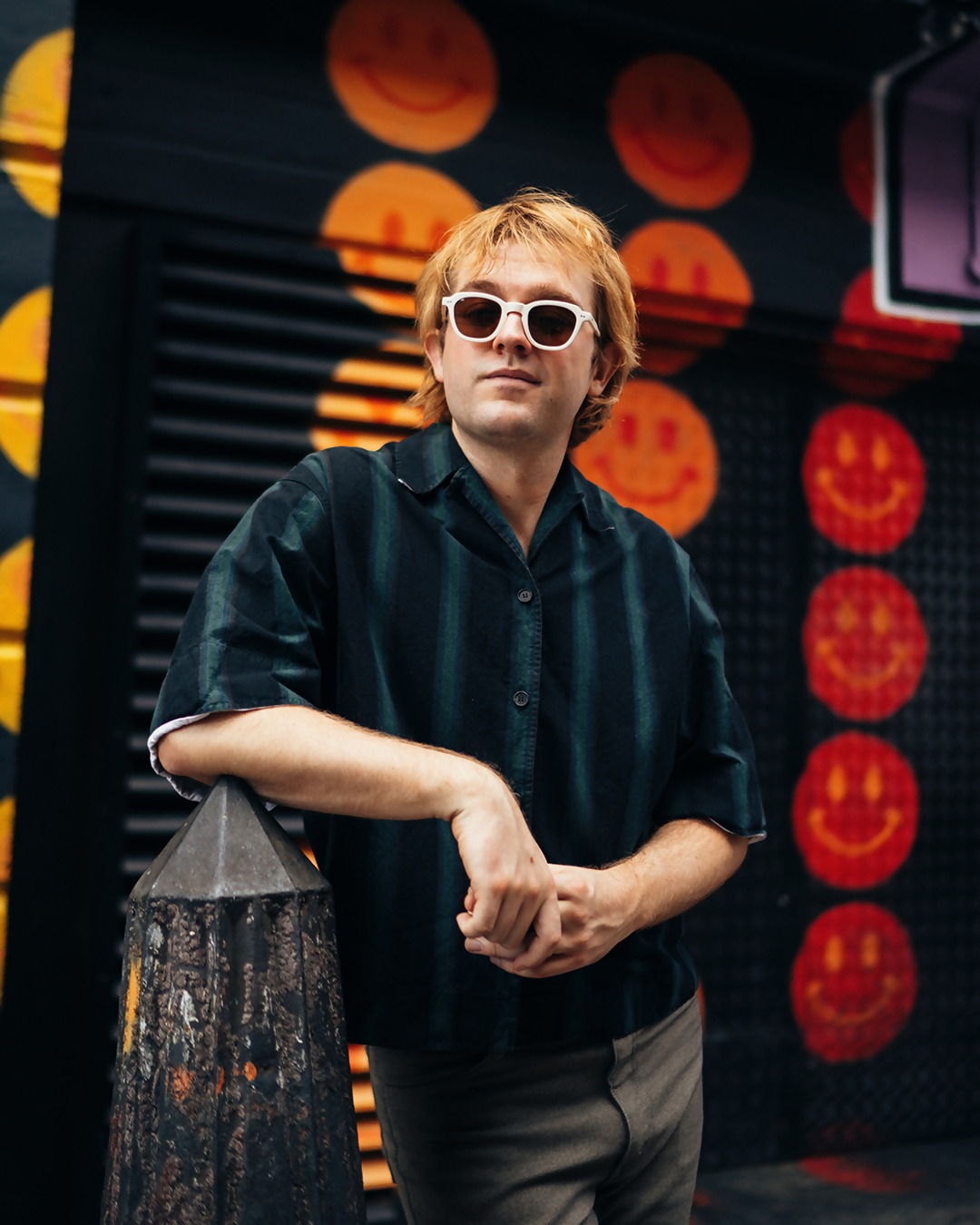
The internet is blamed for many of the world’s ills during the last decade, and not without good reason. But, often, we overlook its upsides. Sloan Struble, who makes music under the moniker Dayglow – his real name like something from a Kerouac novel – has benefited from these more than most. That’s not to say he doesn’t still have qualms.
“Me and the internet have a complex relationship,” he tells me in a hotel lobby in East London. “I owe everything to it. And I hate it. It just gets really hard to be sincere on the internet. It’s the greatest challenge as an artist: to find a way to be transparent using social media. I owe everything to YouTube and the YouTube algorithm, but at the same time, I don’t want to make music thinking about that. So it’s a hard balance, but that’s just the times we’re in.”


And such times have been rather heady for the 23-year-old, significantly since he dropped his euphoric, synth-driven ‘Can I Call You Tonight?’ in early 2018. The breakout hit, the most prominent independent US single that year, has since racked up just shy of 100 million views on YouTube (as well as four times that on Spotify). It also casts an early net on an audience that has since been gifted two albums – which has now been joined by a third, People In Motion. It’s little wonder the burgeoning artist has a fair bit to say about the internet.
His relationship with it goes back further when he would use it to soak up indie-pop and indie-rock artists like Phoenix, Tame Impala, Two Door Cinema Club and MGMT. Born and raised in the “quintessential cow town” of Aledo, just outside of Texas’ Fort Worth (“we had like goats and chickens and stuff”), the internet would be an escapist portal to a world of stimulation and, more importantly, music.
But Sloan isn’t just a product of the internet. That would do him a disservice and place too much emphasis on cyberspace. What he’s managed to capture in his music – and in part, the reason why his tracks do so well – is an upbeat output that isn’t tedious, false or anodyne. For the most part, at least by my cynical calculation, joy in art is often designed as a naïve distraction from the reality of life. Sure, there’s a time when switching on Friends, for instance, with its canned laughter, can provide necessary comfort, but it’s only that, a comfort, a refusal to embrace all of life’s quirks.
Yet this is an artistic tightrope Sloan has walked with aplomb. And one he doesn’t take lightly. “I think it’s the greatest challenge: making honest, optimistic art,” he muses. “I think most art that’s celebrated for being honest or artsy is almost always pretty dark, or deep and emotional.


“But joy is just as much of an emotion as depression is. There’s a time and place for everything, and I think my calling as an artist is to encourage people to look at their life with hope.
“That’d be great if I can manage to do that – and be sincere while doing it. I’m definitely not always a happy person, but I think with my art, I hope to encourage people, rather than the alternative.”
It’s worth heeding the advice of someone with Sloan’s outlook. After dropping his full-length debut album, Fuzzybrain, the week he began college at The University of Texas – Sloan even made the sculpted self-portrait on the album cover the night before he left. His get-up-and-go is admirable. And as the success of that album began to take hold, “pretty soon I was having a hard time staying in classes,” he recalls, rather humbly.
Ironically, those classes were for a course in marketing. Not that Sloan needed them, finding determined ways to push his work. “I would look on Instagram, like every city I could think of, and find an indie music blog there. I would email them, ‘Hey, I made this album.’ Three people posted about it, say, out of probably 60 emails. But those three somehow got it to be on Discover Weekly on Spotify, which then [got it] onto Spotify Bedroom Pop, and then everything kind of went from there.”


Pretty soon, the industry turned its nosey head, spotting the success of a self-produced, self-taught, self-marketed newcomer who, crucially, seemed able to generate his own online buzz. And the labels came calling after a few shows in Austin during his first semester, including at well-known South by Southwest, by his second term.
“Somehow a lot of labels and music industry people had found my school email – the email the college gives you – and were emailing me. While I was trying to do my online homework, I was also getting emails from Columbia Records and stuff. It was crazy.”
But Sloan rejected this pull of industry bigheads. After all, he’d come this far, so why would he need anyone’s help now? He’s still keen to hold onto such an independent-minded, self-confident approach.
“I had no reference for anything, which is good. It forced me to focus on my sound and have my own idea of how the music industry should and does work and work. And that gave me an internal compass for navigating things–because some sketchy people reached out to me.


“Thankfully, I just knew how to navigate that, because I was so hyper-focused on doing it myself; I’d made a whole album myself. I’m working with people now, but I’m still completely independent, creatively, and make all my music myself and produce it and mix it.”
To some extent, I bring up in our conversation – trying to at least prise something from his exceptionally calm, rather soothing demeanour – his challenge has been a distinct absence of one. He hasn’t put a foot wrong.
First came his sincere, rosy debut; then his equally heartfelt follow-up, Harmony’s House, which shimmies and shakes with disco-infused moments and embraces the comedown in other parts, like falling into a sea of cushions. “I don’t know,” he pauses. “I mean, I have really great fans. And I think that’s really important. I try to really focus on making good music.”
Inspired by a lot of ’70s and ’80s yacht rock, whilst cooped up indoors during the pandemic, Harmony’s House was Sloan’s attempt to devise a sitcom-style world of the same era whilst drawing on his increasing popularity as an artist.


“I felt like the world was watching me in my house, because I kept doing all these interviews from there. I was gaining fame while just sitting in my house. It felt like a Truman Show-type thing, where there’s a sitcom and people expect me to be scripted while living my life. So I wrote the album through that angle of me being a sitcom character, and then that helped me write the songs.”
And as with building any house, Sloan’s main objective is to ensure strong foundations, to create something that endures for the long-term. “It’s my greatest fear,” he says when asked about concerns of being an artistic flash in the pan, finally breaking away, for the slightest moment, from his steady composure.
“It’s what I’m always working for, just figuring out a way to sustain it. I want this to be my career. I’m not trying to spend all the money I have as quick as possible, buying nice stuff. I want to have a family and not spend it all now.”
Unsurprisingly, family and security are on the young man’s mind. During the process of writing People In Motion, the 23-year-old couldn’t help but propose to his childhood sweetheart, Reagan. The typical upbeat positivity, so present in his records to date, has therefore become shrouded in that most profound of reasons to smile: love.


“I don’t usually write [my songs] for people. But I guess this was the first album where I directly wrote songs that were about what’s happened in my life. So I was thinking of Reagan when I wrote songs [for People In Motion].”
His quip “What use is a song when I wrote it for no one?” on the People In Motion track ‘Like She Does’, for instance, is an expression of self-realisation as much as anything.
There are a couple more aspects to the record beyond his personal milestone of marriage, too. Initially, the product of Sloan wanting to make a dance album – of which many elements are still present – People In Motion’s title is not only a description of “a fun way of describing dancing” but also something heavier. A state of flux that we’ve all experienced in the last few years at least. “We’re in such a quick-paced culture right now. Our memory is horrible. And we forget everything after it happened.”
Another lyric, he explains, this time on the track ‘Radio’, both includes and spells out this concept: “We’re all just people / People in motion / And we’re always moving / But it seems we’re never growing”.


“I felt like that kind of explains the times. For instance, it’s like there’s so many restaurants around us, but there’s so many scenarios where me and my band are sitting for an hour, saying, ‘Which one do we go to?’ Or it’s like there’s 20 options on Netflix, but you can only pick one. That’s just kind of how life feels. It’s kind of a little album about the chaos of the world and trying to find a way to navigate it.”
Indeed, the internet can be both a cause and reflective of the troubling world we find ourselves in currently. But with love, a sense of belief in himself and that ever-positive yet realistic mindset, Sloan Struble, aka Dayglow, is finding a way to chart his path. And is doing so with a smile on his face.
People In Motion is out now.
Dayglow is also on tour in the UK in February and March 2023; click here for more information and to buy tickets.




